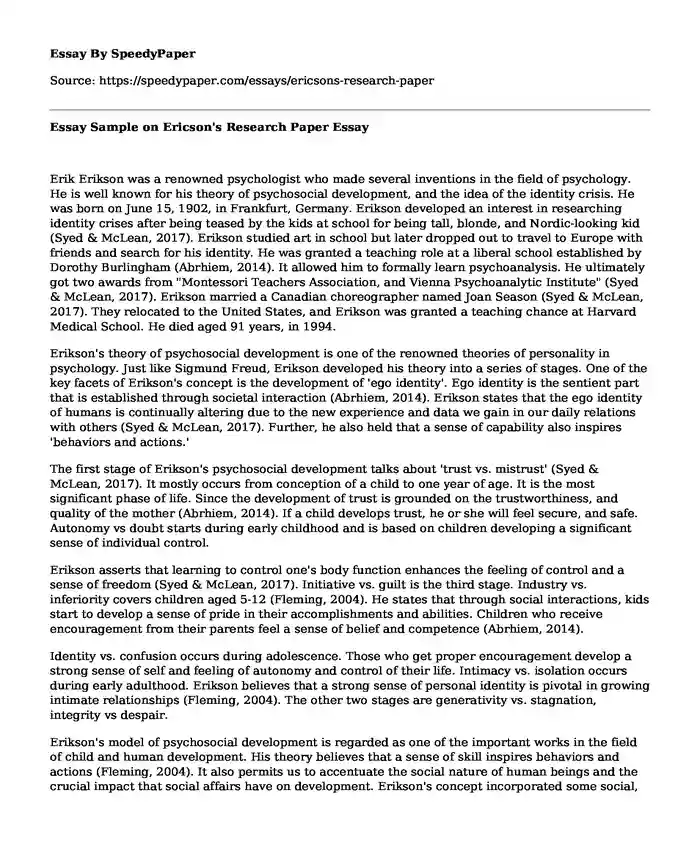
| Type of paper: | Research paper |
| Categories: | Research Social psychology Personal development Developmental psychology |
| Pages: | 3 |
| Wordcount: | 661 words |
Erik Erikson was a renowned psychologist who made several inventions in the field of psychology. He is well known for his theory of psychosocial development, and the idea of the identity crisis. He was born on June 15, 1902, in Frankfurt, Germany. Erikson developed an interest in researching identity crises after being teased by the kids at school for being tall, blonde, and Nordic-looking kid (Syed & McLean, 2017). Erikson studied art in school but later dropped out to travel to Europe with friends and search for his identity. He was granted a teaching role at a liberal school established by Dorothy Burlingham (Abrhiem, 2014). It allowed him to formally learn psychoanalysis. He ultimately got two awards from "Montessori Teachers Association, and Vienna Psychoanalytic Institute" (Syed & McLean, 2017). Erikson married a Canadian choreographer named Joan Season (Syed & McLean, 2017). They relocated to the United States, and Erikson was granted a teaching chance at Harvard Medical School. He died aged 91 years, in 1994.
Erikson's theory of psychosocial development is one of the renowned theories of personality in psychology. Just like Sigmund Freud, Erikson developed his theory into a series of stages. One of the key facets of Erikson's concept is the development of 'ego identity'. Ego identity is the sentient part that is established through societal interaction (Abrhiem, 2014). Erikson states that the ego identity of humans is continually altering due to the new experience and data we gain in our daily relations with others (Syed & McLean, 2017). Further, he also held that a sense of capability also inspires 'behaviors and actions.'
The first stage of Erikson's psychosocial development talks about 'trust vs. mistrust' (Syed & McLean, 2017). It mostly occurs from conception of a child to one year of age. It is the most significant phase of life. Since the development of trust is grounded on the trustworthiness, and quality of the mother (Abrhiem, 2014). If a child develops trust, he or she will feel secure, and safe. Autonomy vs doubt starts during early childhood and is based on children developing a significant sense of individual control.
Erikson asserts that learning to control one's body function enhances the feeling of control and a sense of freedom (Syed & McLean, 2017). Initiative vs. guilt is the third stage. Industry vs. inferiority covers children aged 5-12 (Fleming, 2004). He states that through social interactions, kids start to develop a sense of pride in their accomplishments and abilities. Children who receive encouragement from their parents feel a sense of belief and competence (Abrhiem, 2014).
Identity vs. confusion occurs during adolescence. Those who get proper encouragement develop a strong sense of self and feeling of autonomy and control of their life. Intimacy vs. isolation occurs during early adulthood. Erikson believes that a strong sense of personal identity is pivotal in growing intimate relationships (Fleming, 2004). The other two stages are generativity vs. stagnation, integrity vs despair.
Erikson's model of psychosocial development is regarded as one of the important works in the field of child and human development. His theory believes that a sense of skill inspires behaviors and actions (Fleming, 2004). It also permits us to accentuate the social nature of human beings and the crucial impact that social affairs have on development. Erikson's concept incorporated some social, and cultural ideas by illustrating how social interactions and encouragement from guardians help in the development of a child (Abrhiem, 2014). Unlike Freud's concept of psychosexual phases, I chose Erikson's theory since it accentuates the impact of social experience in child and human development through ego identity (Fleming, 2004).
References
Abrhiem, T. H. (2014). The role of parenting styles in psychosocial development of adolescents. Business and Management Review, 3(11), 47-52. Retrieved from: https://pdfs.semanticscholar.org/ef27/9a625bb60c0cf4dfd9e8aad00e35309af427.pdf
Fleming, S. J. (2004). Erikson's Psychosocial Developmental Stages. Retrieved from: https://pdfs.semanticscholar.org/ab44/d6a2d3178e4e159108ab5333504d23cc9508.pdf
Syed, M., & McLean, K. C. (2017). Erikson's theory of psychosocial development. Retrieved from: file:///C:/Users/User/Downloads/Syed&McLean,inpress-DisordersEncyclo.pdf
Cite this page
Essay Sample on Ericson's Research Paper. (2023, Feb 10). Retrieved from https://speedypaper.com/essays/ericsons-research-paper
Request Removal
If you are the original author of this essay and no longer wish to have it published on the SpeedyPaper website, please click below to request its removal:
- Free Essay on the Best Theories of War Used to Describe World War 1
- Free Essay with Social Media Strategy Example
- Free Essay on Customs and Border Protection Operations
- Essay Sample for You: Restaurant Wine List on Wine Marketing
- Free Essay: A Governance Framework for Assessing Service Quality in the Mobile Banking Sector
- Learning Kansas History Through Online Games, Essay Example
- Paper Example - Windsor Spitfires
Popular categories




